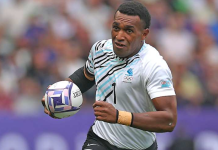World Rugby needs to recalibrate its international calendar to enable more players like Antoine Dupont to switch between sevens and 15s, according to the federation’s CEO, Alan Gilpin.
Dupont played a starring role, scoring two second-half tries and setting up another, as France claimed its first gold of the Paris Games by beating two-time defending champions Fiji in Saturday’s final.
In front of another delirious capacity crowd of 69,000 at the Stade de France, Gilpin said the success of the men’s had surpassed expectations.
“It’s everything we could have hoped for,” World Rugby’s Gilpin told AFP.
“We always said this was a coming-of-age moment. We sold eight sessions out of 550,000 tickets. Incredible.”
Gilpin added: “This has been everything we wanted it to be, which was to put rugby sevens on a big stage.
“Rugby sevens is great for the Games and the Games is great for rugby sevens and that’s absolutely what we want.
He said the three-day women’s tournament, which kicks off later Sunday, would also make history as the best attended women’s rugby event ever.
“69,000 people are going to be here watching women’s rugby, which is incredible.”
The success of the “bold” decision to host the sevens at the Stade de France has raised eyebrows.
Gilpin said he had already held talks with organisers of the next two Olympics, in Los Angeles and Brisbane in 2028 and 2032 respectively, about potential stadium capacities.
While the player crossover in women’s rugby between sevens and 15s is more common, Gilpin conceded that the challenge for World Rugby was the “incredibly congested” men’s calendar.
“When we rewind to the Rugby World Cup here last year, the South Africans had six players in their squad that had played sevens. So they’ve found a way to make that pathway work,” he said.
Gilpin suggested that World Rugby needed to work to “de-conflict some parts of the calendar”, notably looking at the sevens calendar and “making sure that it works over a four-year period”.
“Can we create a view of the calendar that allows a player like Dupont… to say, ‘Right, I’m going to play a year of 15s, but I’m going to pick these moments to build to Olympic Games and sevens because it’s the stage, it’s the platform that I otherwise wouldn’t have’?”
In the past, the issue has been clouded by releasing players from their primary employers, their clubs, as well as scheduling clashes, with the sevens series currently a seven-month long international season.
“France have done a great job with Antoine of dipping in and out, but is that possible for other unions? And how can we make that easier?” Gilpin asked.
“If we think forward to the Six Nations or the Rugby Championships that precede the 2028 Los Angeles Games, how can those players be playing in that, but also have the opportunities in that year in advance to prepare?
“De-conflicting parts of the calendar to allow that to happen would be helpful.”
Work post-Paris would entail negotiating with federations in the next four years “to find a way for sevens to be a more meaningful part of international rugby”.
“We know it’s got that opportunity to grow the game in a way that, in some markets, 15s probably certainly won’t have in the short term,” he said, citing China and Brazil as examples of countries with teams in the women’s draw.


















